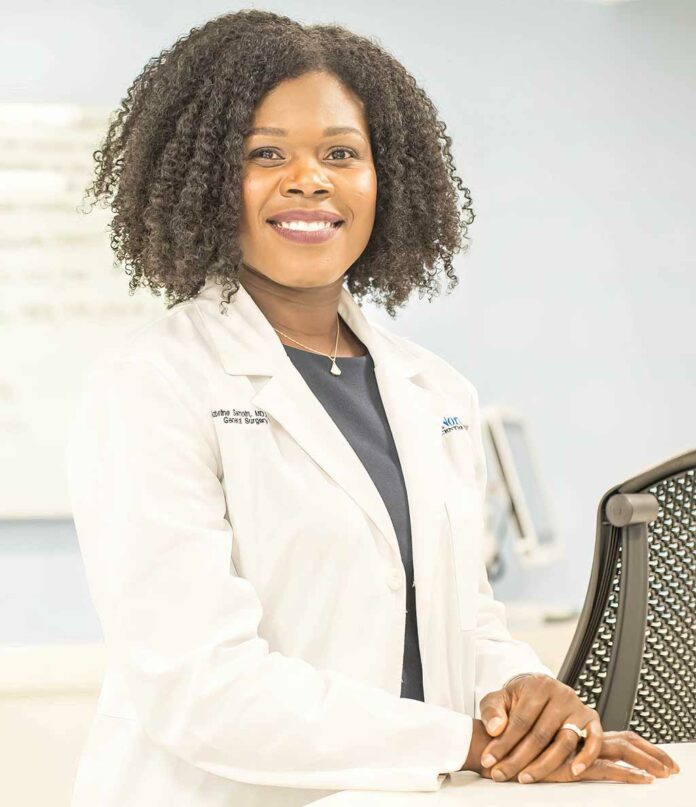Written by Nephtalie Hyacinthe
The Haitian Community is lucky to receive the service of Haitian surgeon Dr. Sabrine Semoin, a board-certified and university-accredited surgeon. She is the only female surgeon in South Florida’s Haitian community. Like many Haitian-Americans who have immigrated, she has faced many challenges, but she has overcame them and become an asset to her community.
Dr. Semoin moved from Haiti to the US when she was in 10th grade. She was about 14 years old, had an accent, and many just assumed that she wasn’t bright. Dr. Semoin recalled a time when her guidance counselor told her that she couldn’t take honor classes because she didn’t speak English. However, she adjusted to the different culture and overcame all of these obstacles.
Dr. Semoin worked as a pharmacy technician, and whilst working here, she met her lifelong mentor who eventually guided her into a different field. “I wanted to be a psychologist, but two years into it, I realized I didn’t like chronicle psychology, and decided to do the Pre-Med track instead. I later wanted to be a pediatrician, but life had different plans”, added Dr. Semoin.
Dr. Semoin took an interest in surgery during a mission trip to Haiti in her first year of medical school at Howard University. For the duration of this trip, she was placed in the operating room to translate, and participated in the cases for two weeks. During this experience she came to realize she was on the right path. “I knew it was a perfect fit for me”, said Dr. Semoin.
In June 2019, after Dr. Semoin relocated from Tampa to Miami, she opened her private practice under the name of South Florida Surgery. South Florida wasn’t new to Dr. Semoin, as earlier she had graduated from Deerfield Beach High School and Florida Atlantic University (FAU). “It’s home to me”, said Dr. Semoin. And there was a need for Haitian surgeons in the community.
Dr. Semoin offers minimally invasive surgery as well as other types of surgery. For example, a common type of surgery is removal of the gallbladder. This is done by insertion of the camera, without actually making an open incision. “The robot is very useful, as it allows the surgeon to have a 360-degree hand motion, which makes [the operation] possible without ever having to open the body. It’s very easy, and involves less pain and a quicker recovery. This is a much better option than a big open wound”, advised Dr. Semoin.
Having a Haitian surgeon can make a huge difference in the care of a Haitian patient. A Haitian surgeon can explain things in a way that the patient can better understand. “Language and cultural barrier nuances play a much bigger role than one might expect. Other providers can provide the facts, however I can share the information better”, explained Dr. Semoin. She finds opportunities to help her patients very rewarding. “My mother barely speaks English. She is essentially one of my patients”, continued Dr. Semoin. She approaches every patient how she would want her mother to be treated. “It’s very personal and relatable. I am comfortable to share with my community, and people should take advantage of that. The Haitian kid has grown up and now she is here to serve the community”, added Dr. Semoin.
Dr. Semoin’s biggest takeaway from the military is leadership and teamwork. As a military surgeon, she has learnt how to perform under tremendous stress and huge amounts of pressure. She also knows how to lead her team. “You always have to be the person that can hold it together. I always take that mindset with me”, said Dr. Semoin. Her experience has made her a great team player and administrator. She has never looked at a situation as a ‘one woman show’. The military has also given her a heart for service, and the desire and ability to give back to a group of people who had contributed to her progress. “There are many options for me to choose from and I have chosen to be of service to my community. If not me, then who?”, said Dr. Semoin humbly.
Here are a few key things that Dr. Semoin recommends you consider before having a minimally invasive surgery:
- A good relationship with your surgeon
- Reason for your surgery
- Operative period
- Possible alternatives to surgery
- Any options in the surgery
- Ask any questions you may have
- Understand the answers to your questions
- Make the decision to do the surgery
- Make sure you have a good surgeon who is well trained
- Make sure your surgeon has the credentials, shows empathy, and respects you as an individual
“I just want to make sure people know that I am here to serve them. The goal is to increase access to better techniques and to improve quality of care than what they have been getting”, continued Dr. Semoin.
Dr. Semoin has also obtained a degree in Health Administration. She believes that if someone doesn’t have a seat at the table, it’s very hard to make positive changes. Dr. Semoin sits on several committees so that she can advocate on behalf of patients. Her practice plans social events for the patients, community days, community benefits, and provides them knowledge they wouldn’t otherwise have. “My goal is to make sure that the role the Haitian community plays will not be undervalued and that they should cater to us like they do any other communities. I work with social workers and case managers to make sure that patients know what is available to them in a language that they speak. I believe in equitable care for the Haitian Community”, Dr. Semoin concluded.
Contact:
For all matters related to surgery, Dr. Semoin can be reached at:
South Florida Surgery
16695 NE 10 Avenue, North Miami Beach
786-773-5332
She accepts all major insurances, Medicare and Medicaid.


